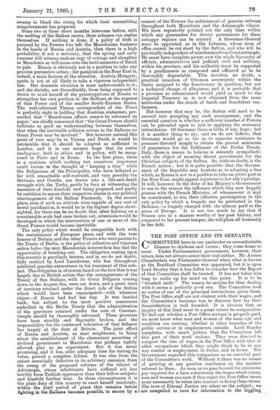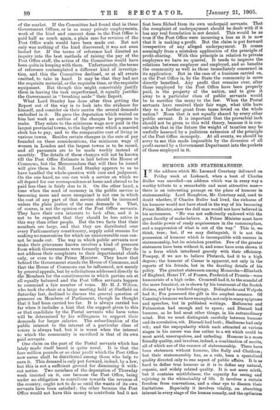C OMMITTEES have in one particular an uncomfortable likeness to chickens
and curses ; they come home to roost. Under Parliamentary government, however, their return does not always annoy their real author. Mr. Austen Chamberlain was Postmaster-General when what is known as the Bradford Committee was appointed, but it is upon Lord Stanley that it has fallen to consider how the Report of that Committee shall be treated. It has not taken him long to make up his mind on this point. It is to be " brushed aside." The reason he assigns for thus dealing with it seems a perfectly good one. The Committee took no notice of one of the principal instructions given them. The Post Office staff are not content with their wages, and the Committee's business was to discover how far their dissatisfaction is well founded. It is obvious that an inquiry of this kind must to a great extent be comparative. To find out whether a Post Office servant is properly paid, we must know what men and women of the same age and condition are earning, whether in other branches of the public service or in employments outside. Lord Stanley complains, with much justice, that the Committee left this part of their work undone. They were directed to compare the rate of wages in the Post Office with that of other occupations which they might think to be in any way similar in employment, in duties, and in hours. The Government regarded this comparison as an essential part of the Committee's work. Without it there was no means of arriving at any positive conclusion on the matters referred to them. As soon as we pass beyond the minimum pay required for a bare subsistence, the wages which young men and women can earn if they reject the Post Office terms must necessarily be taken into account in fixing these terms. The laws of Eternal Justice are silent on the subject; we are compelled to turn for information to the higgling of the market. If the Committee had found that in three Government Offices, or in as many private employments, work of the kind and amount done in the Post Office is paid half as much again, a plain case for revision of the Post Office scale would have been made out. But not only was nothing of the kind discovered, it was not even looked for. If the terms of reference had directed an inquiry into the best methods of raising the pay of the Post Office staff, the action of the Committee would have been quite in keeping with them. Unfortunately, the terms of reference contemplated a different kind of investiga- tion, and this the Committee declined, or at all events omitted, to take in hand. It may be that they had not the requisite material, or the requisite time, or the requisite equipment. But though this might conceivably justify them in leaving the task unperformed, it equally justifies the Government in "brushing aside" their Report. What Lord Stanley has done after thus getting the Report out of the way is to look into the evidence for himself, and consider on their merits the several demands embodied in it. He gave the deputation which waited on him last week an outline of the changes he proposes to make. They relate to the minimum wage now paid in the largest provincial towns, to the higher rent which a married clerk has to pay, and to the comparative cost of living in various towns. Besides certain changes in the rate of pay founded on these considerations, the minimum wage of women in London and the largest towns is to be raised, and all payments are to be made weekly instead of monthly. The details of these changes will not be known till the Post Office Estimate is laid before the House of Commons, but the Memorandum that will then be issued will give them in full. Lord Stanley appears to us to have handled the whole question with care and judgment. On the one hand, no one can wish a service on which we all depend for our correspondence at home and abroad to be paid less than is fairly due to it. On the other hand, a time when the need of economy in the public service is becoming more and more recognised is not one in which the cost of any part of that service should be increased unless the plain justice of the case demands it. That, of course, is not the opinion of the Post Office servants. They have their own interests to look after, and it is not to be expected that they should be less active in this way than other people. But the two facts that their numbers are large, and that they are distributed over every Parliamentary constituency, supply solid reasons for making no concessions for which an unanswerable case can- npt be made out. The way in which public servants now Make their grievances known involves a kind of pressure from which Governments were formerly exempt. They do not address their complaints to their departmental chiefs only, or even to the Prime Minister. They know that behind the Government stands the House of Commons, and that the House of Commons can be influenced, not merely by general appeals, but by solicitations addressed directly to the Members for the constituencies in which parties are at all equally balanced and the Post 'Office servants happen to command a fair number of votes. Mr. H. J. Wilson, who took the chair at a large meeting held at Sheffield on Saturday last, declined to discuss the general question of pressure on Members of Parliament, though he thought that it had been carried too far. It is always carried too far when it includes a hint that the support given to this or that candidate by the Postal servants who have votes will be determined by his willingness to support their demands for larger salaries. The subordination of the public interest to the interest of a particular class of voters is always bad, but it is worst when the interest to which the community is sacrificed is that of its own paid servants. One claim on the part of the Postal servants which has lately made itself heard is quite novel. It is that the four million pounds or so clear profit which the Post Office now earns shall be distributed among those who help to earn it. This demand is only put forward, indeed, by a few, but this is not a sufficient ground for dismissing it with- out notice. Two members of the deputation of Thursday week insisted on it, one because the Post Office, being under no obligation to contribute towards the revenue of the country, ought not to do so until the wants of its own servants have been satisfied ; the other because the Post Office would not have this money to Contribute had it not first been filched from its own underpaid servants. That the complaint of underpayment should be dealt with if it has any real foundation is not denied. This would be as true if the Post Office were incurring a loss as it is now that it is making a profit. But the claim is put forward irrespective of any alleged underpayment. It comes seemingly from a mistaken application of the principle of profit-sharing. With this principle in relation to private employers we have no quarrel. It tends to improve the relations between employer and employed, and so benefits the community as well as those immediately concerned in its application. But in the case of a business carried on, as the Post Office is, by the State the community is more directly benefited. Any profit that remains over, after those employed by the Post Office have been properly paid, is the property of the nation, and to give it away to a particular class of public servants would be to sacrifice the many to the few. When the Postal servants have received their fair wage, what title have they to a further grant from taxes levied on the whole nation ? None that is not equally shared by every other public servant. It is important that the proverbial inch should not be given to this wild theory, because it is con- ceivable that in the future the weight of taxation may be usefully lessened by a judicious extension of the principle of the Post Office monopoly. At all events, we should be sorry to see this made impossible by the diversion of all profit earned by a Government Department into the pockets of those employed in it.







































 Previous page
Previous page